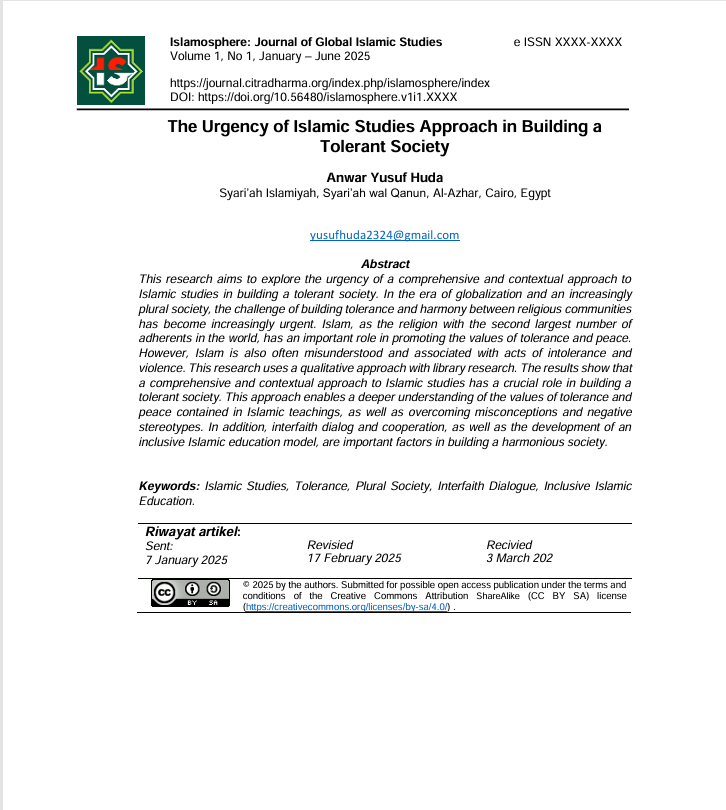The Urgency of Islamic Studies Approach in Building a Tolerant Society
The Urgency of Islamic Studies Approach in Building a Tolerant Society
 Abstract View:
Abstract View:
30
 PDF downloads:
PDF downloads:
40
Keywords:
Islamic Studies, Tolerance, Plural Society, Interfaith Dialogue, Inclusive Islamic EducationAbstract
This research aims to explore the urgency of a comprehensive and contextual approach to Islamic studies in building a tolerant society. In the era of globalization and an increasingly plural society, the challenge of building tolerance and harmony between religious communities has become increasingly urgent. Islam, as the religion with the second largest number of adherents in the world, has an important role in promoting the values of tolerance and peace. However, Islam is also often misunderstood and associated with acts of intolerance and violence. This research uses a qualitative approach with library research. The results show that a comprehensive and contextual approach to Islamic studies has a crucial role in building a tolerant society. This approach enables a deeper understanding of the values of tolerance and peace contained in Islamic teachings, as well as overcoming misconceptions and negative stereotypes. In addition, interfaith dialog and cooperation, as well as the development of an inclusive Islamic education model, are important factors in building a harmonious society.
References
An-NaÀim, A. A., & Islam. (2008). Islam and the Negotiating the Future of Shari’a. HARVARD UNIVERSITY PRESS. https://www.hup.harvard.edu/books/9780674034563
Bayat, A. (2019). Islam and Democracy: What is the Real Question? Sustainability (Switzerland), 11(1), 1–14. http://scioteca.caf.com/bitstream/handle/123456789/1091/RED2017-Eng-8ene.pdf?sequence=12&isAllowed=y%0Ahttp://dx.doi.org/10.1016/j.regsciurbeco.2008.06.005%0Ahttps://www.researchgate.net/publication/305320484_SISTEM_PEMBETUNGAN_TERPUSAT_STRATEGI_MELESTARI
Casram, C. (2016). Membangun Sikap Toleransi Beragama dalam Masyarakat Plural. Wawasan: Jurnal Ilmiah Agama Dan Sosial Budaya, 1(2), 187–198. https://doi.org/10.15575/jw.v1i2.588
Esposito, J. L. (2004). ISLAM: The Straight Path. In Anthropology of Consciousness (Vol. 3, Issue 4). Oxford University Press. https://doi.org/10.1525/ac.1994.5.4.25
Fahri, mohammad, A. zainuri. (2022). Moderasi Beragama di Indonesia. Religions, 13(5), 451. http://jurnal.radenfatah.ac.id/index.php/intizar/article/download/5640/3010/
Geertz, C. (1968). Islam Observed: Religious Development in Morocco and Indonesia. THE UNIVERSITY OF CHICAGO PRESS. http://www.amazon.com/Islam-Observed-Religious-Development-Indonesia/dp/0226285111
Hasan, M. (2021). PRINSIP MODERASI BERAGAMA DALAM KEHIDUPAN BERBANGSA Mustaqim. https://kua-bali.id/storage/app/media/uploaded-files/104-Article%20Text-716-1-10-20220805.pdf
Hasni, F., & Kambali. (2022). STUDI ISLAM DALAM PENDEKATAN SOSIOLOGI. Jurnal Sosial Dan Sains, 2(2), 278–285. doi: https://doi.org/10.59188/jurnalsosains.v3i6.816
Kurniasih, I., Rohmatulloh, R., & Al Ayyubi, I. I. (2023). Urgensi Toleransi Beragama di Indonesia. Jazirah: Jurnal Peradaban Dan Kebudayaan, 3(1), 185–193. https://doi.org/10.51190/jazirah.v3i1.62
Mahmud, R. A., Rahman, H. A., & Kambali. (2024). Studi Islam dalam Pendekatan Toleransi dan Kebebasan. Risalah: Jurnal Pendidikan Dan Studi Islam, 10(4), 1696–1703. https://doi.org/10.31943/jurnal_risalah.v10i4.1226.
Miles, M. B., Huberman, A. M., & Saldana, J. (2015). Qualitative Data Analysis: A Methods Sourcebook (3rd ed.). Sage. https://ia803100.us.archive.org/0/items/spradleyanalisisdatakualitatifmodeletnografi/Matthew_Miles%2C_Michael_Hberman%2C_Johnny_Sdana-Qualitative_Data_Analysis__A_Methods_Sourcebook-Sage_%282014%29%5B1%5D.pdf
Nasr, S. H. (2010). ISLAM Religion, History, and Civilization. In October. HarperCollins Publishers. ttps://ia600409.us.archive.org/35/items/IslamReligionHistoryAndCivilization/Islam - Religion%2C History%2C and Civilization.pdf
Prasetiawati, E. (2017). Urgensi Pendidikan Multikultur untuk Menumbuhkan Nilai Toleransi Agama di Indonesia. Tapis : Jurnal Penelitian Ilmiah, 1(02), 272. https://doi.org/10.32332/tapis.v1i02.876
Rahman, F. (1982). Islam & Modernity: Transformation of an Intellectual Tradition. The University of Chicago Press, Chicago 60637. https://ia903207.us.archive.org/2/items/FazlurRahmanIslamandModernity/FazlurRahmanIslamandModernity.pdf
Rosyidi, M. F. A. A. (2019). Konsep Toleransi dalam Islam dan Implementasinya di Masyarakat Indonesia. Jurnal Madaniyah, 9(2), 277–296. https://nasional.tempo.co/read/898613/konflik-atasnama-agama-berpotensi-terjadi-di-
Salamah, N., Nugroho, M. A., & Nugroho, P. (2020). Upaya Menyemai Moderasi Beragama Mahasiswa IAIN Kudus melalui Paradigma Ilmu Islam Terapan. Quality, 8(2), 269. https://doi.org/10.21043/quality.v8i2.7517
Setiawan, J., & Sudrajat, A. (2018). Pemikiran Postmodernisme Dan Pandangannya Terhadap Ilmu Pengetahuan. Jurnal Filsafat, 28(1), 25. https://doi.org/10.22146/jf.33296
Sugiyono. (2013). Metode Penelitian Kuantitatif, Kualitatif, dan R&D (19th ed.). Alfabeta. https://digilib.unigres.ac.id/?p=show_detail&id=43
Suryani, H. (2023). Toleransi Menurut Perspektif Studi Islam: Pemahaman, Relevansi, Tantangan Dan Prospek Dalam Masyarakat Kontemporer. MUSHAF JOURNAL : Jurnal Ilmu Al Quran Dan Hadis, 3(3), 455–466. https://mushafjournal.com/index.php/mj/article/view/196/106
Tohari, H. (2023). Peran Pendidikan Agama Islam dalam Membangun Toleransi Beragama. Kaipi: Kumpulan Artikel Ilmiah Pendidikan Islam, 1(2), 43–47. https://doi.org/10.62070/kaipi.v1i2.34

Downloads
Published
How to Cite
Issue
Section
License
Copyright (c) 2025 Anwar Yusuf Huda

This work is licensed under a Creative Commons Attribution-ShareAlike 4.0 International License.
Copyright Notice
Authors who publish with this journal agree to the following terms:
- Authors retain copyright and grant the journal right of first publication with the work simultaneously licensed under a Creative Commons Attribution-ShareAlike 4.0 International License that allows others to share the work with an acknowledgment of the work's authorship and initial publication in this journal.
- Authors are able to enter into separate, additional contractual arrangements for the non-exclusive distribution of the journal's published version of the work (e.g., post it to an institutional repository or publish it in a book), with an acknowledgment of its initial publication in this journal.
- Authors are permitted and encouraged to post their work online (e.g., in institutional repositories or on their website) prior to and during the submission process, as it can lead to productive exchanges, as well as earlier and greater citation of published work (See The Effect of Open Access).

This work is licensed under a Creative Commons Attribution-ShareAlike 4.0 International License.




